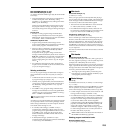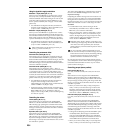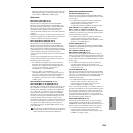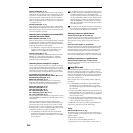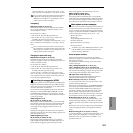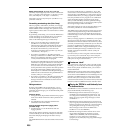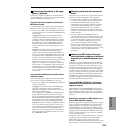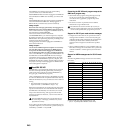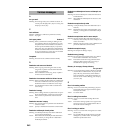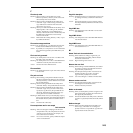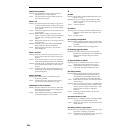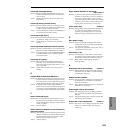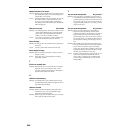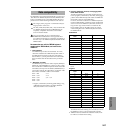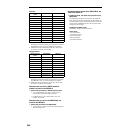
241
Appendices
About standard MIDI files
Standard MIDI files (SMF) make it possible for different
computer programs or musical instruments made by differ-
ent manufacturers to exchange time-based MIDI data. Each
standard MIDI file contains one song. This instrument sup-
ports format 0 (type 0) in which all of the MIDI data is com-
bined into one track, and format 1 (type 1) in which the data
is separated by track.
When a SMF is loaded into a song in Media mode, the pro-
gram bank that is selected will differ depending on “Bank
Map” (GLOBAL 1.1–2a) setting. When playing/loading
SMF data that conforms to the GM/GS/XG specifications,
set “Bank Map” to GM.
Sequencer mode
In Media mode when you convert a song into a Standard
MIDI File and save it, you can choose either format 0 or for-
mat 1.
• If the TRITON Le’s song data that was saved as a format
1 SMF file is loaded into another device, the track
configuration may be different than it was before being
saved. This is because tracks that contain no musical
data are omitted, and the remaining tracks are moved
into the unused tracks. This will not affect the playback
itself.
• If song data that was saved by another device as a
format 1 SMF file is loaded into this instrument, the
track configuration may be different than it was before
being saved. This is because tracks that contain no
musical data are omitted, and the remaining tracks are
moved into the unused tracks. This will not affect the
playback itself.
When exchanging sequence data between two Future
instruments, we recommend that you save the sequence
data in this instrument’s native format (“Save SEQ”).
When sequence data is saved in this instrument’s native for-
mat, all of the settings and patterns unique to this instru-
ment will be saved, which will ensure a higher level of
reproducibility than when the data is saved as a Standard
MIDI File (“Save to Std MIDI File”).
When a GM System On message is received, the system will
be initialized for GM playback. (“GM Initialize” ☞p.54)



